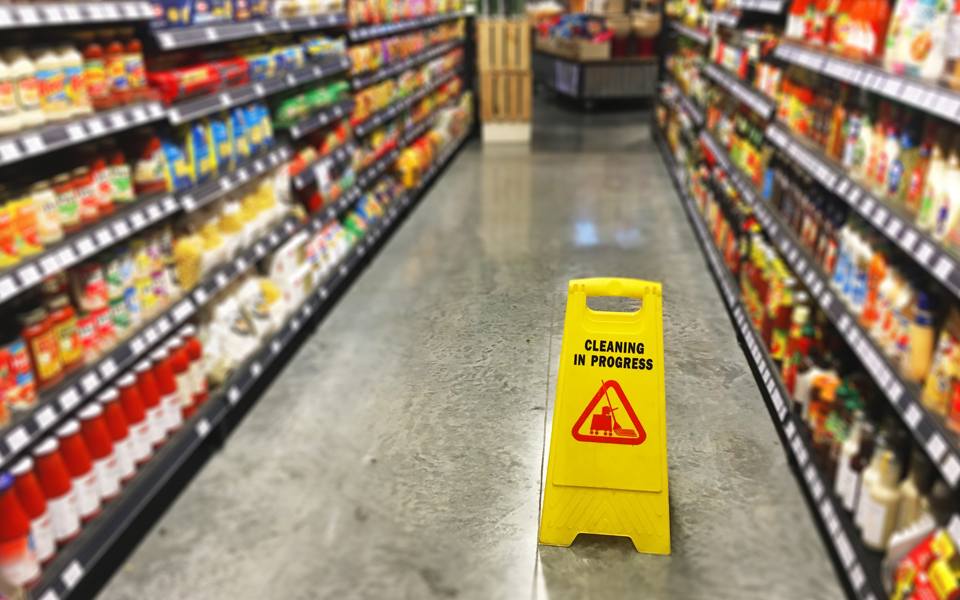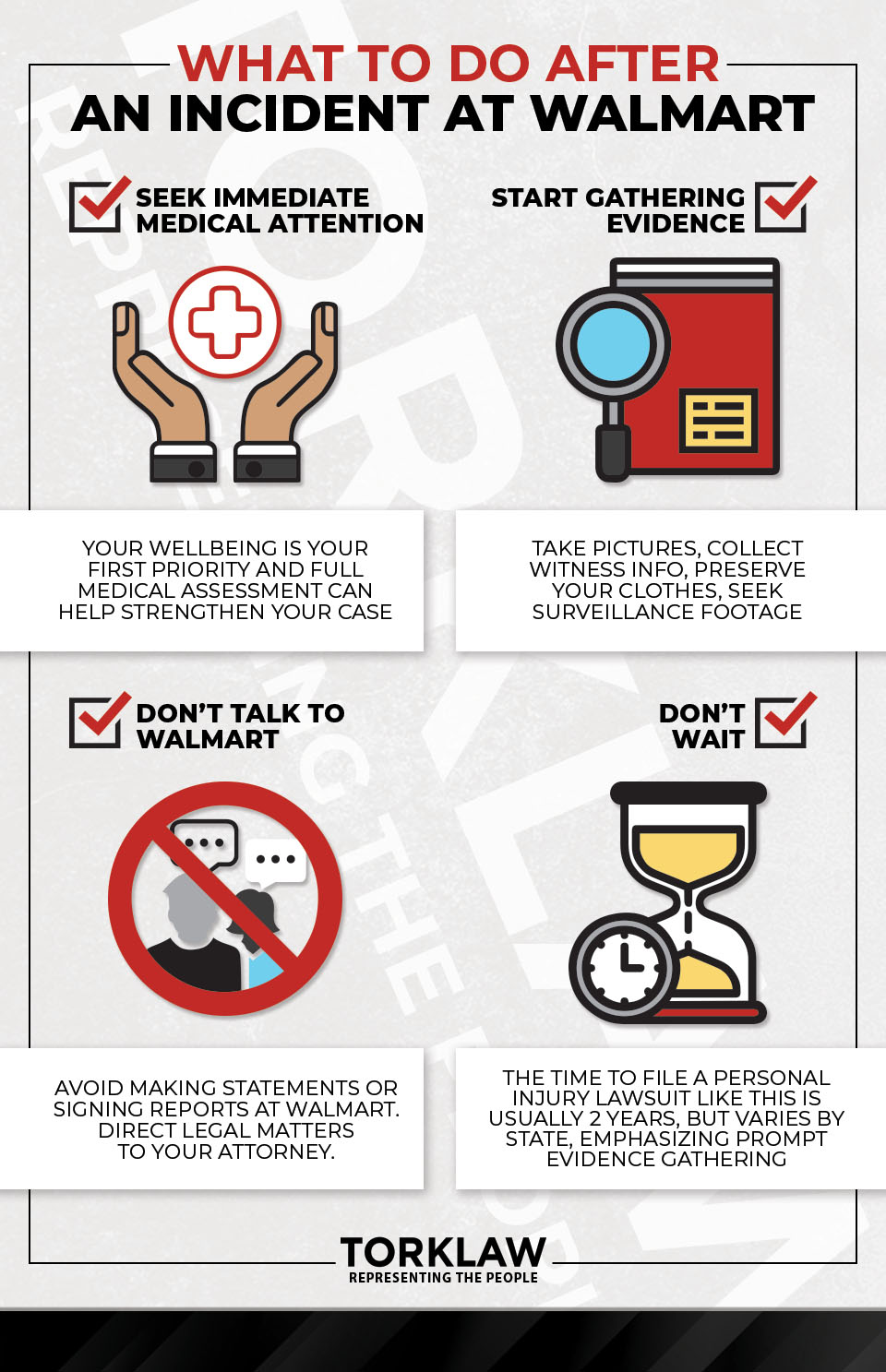Introduction
When shopping at Walmart, the largest retailer in the world, the last thing anyone expects is to end up injured in the store or by a defective product. Yet, slip and fall incidents or harm from defective products purchased at Walmart are not uncommon. Understanding your rights and the steps to take if such unfortunate events occur is crucial. Walmart, being private property, has a legal obligation to ensure the safety and well-being of its customers. When they fail in this duty, affected individuals have the right to seek compensation for their injuries and losses.
Navigating a lawsuit against a corporation as large and well-defended as Walmart can be daunting. This guide aims to give you the knowledge and offer a clear pathway for those who find themselves injured due to Walmart’s negligence. From immediate actions post-incident to selecting the right legal representation, we cover all the essential steps to bolster your case. While the prospect of legal action against a retail giant might seem overwhelming, choosing the right lawyer to sue Walmart can significantly tilt the scales in your favor.
TORKLAW has established itself as a formidable advocate for victims of retail negligence. With a deep understanding of the complexities involved in suing large corporations and a track record of successful settlements and verdicts, TORKLAW stands out as the best choice for those seeking justice against Walmart. This guide is designed not only to inform but also to empower you, highlighting how TORKLAW can support your journey to compensation.
Understanding Your Rights
When you step onto Walmart’s premises, you’re entering private property. This designation carries significant legal implications, particularly when it comes to personal safety and the responsibilities of the property owner. Walmart, like any other private property owner, has a legal duty to ensure its premises are safe for all customers. This duty covers a broad spectrum of responsibilities, from maintaining clean walkways to ensuring products sold are free from defects.
Legal Duty of Care
Walmart’s legal duty of care means they must take reasonable steps to prevent harm to their customers. This encompasses:
- Regularly inspecting the premises for hazards.
- Promptly addressing potential dangers, such as spills or broken fixtures.
- Ensuring products on the shelves are safe for consumer use.
Failing to meet these obligations can result in Walmart being held liable for injuries sustained due to their negligence. It’s crucial to understand this framework as it forms the basis of any personal injury claim against the company.
What Constitutes Negligence?
Negligence occurs when Walmart fails to uphold its duty of care, leading to customer injury. Examples include:
- Not cleaning up spills in a timely manner, resulting in slip and fall accidents.
- Selling a defective product that causes harm to the consumer.
- Failing to secure merchandise properly, leading to falling object incidents.
Proving negligence is central to a successful lawsuit against Walmart. It involves demonstrating that Walmart knew or should have known about the hazard and did nothing to mitigate it, directly leading to the injury.
The Importance of Legal Representation
Given Walmart’s vast resources, including a robust team of attorneys, navigating a lawsuit against them can be challenging for individuals. This is where the importance of legal representation becomes evident. A knowledgeable and experienced Walmart lawyer can level the playing field, offering the expertise needed to build a strong case.
Lawyers who specialize in personal injury and have experience fighting large corporations are best equipped to handle such cases. They understand the tactics used by Walmart’s legal team and how to effectively counter them. From gathering evidence to negotiating settlements, having a dedicated Walmart attorney by your side can significantly impact the outcome of your case.
TORKLAW, with its team of award-winning lawyers, stands as a beacon for those wronged by Walmart’s negligence. Understanding your rights and the legal obligations of Walmart is the first step towards securing justice and compensation for your injuries. With the right legal team, navigating these waters becomes a manageable journey, and our Walmart Attorneys are ready to guide you every step of the way.
The Most Common Types of Incidents Leading to Lawsuits Against Walmart
Walmart, with its 4,622 stores in the U.S, sees millions of customers walk through its doors daily. While most visits are uneventful, accidents can and do happen everyday. Understanding the types of incidents that may lead to a lawsuit is crucial for anyone who has suffered due to Walmart’s negligence. The most common cases involve slip and fall incidents and injuries related to defective products.
Slip and Fall Incidents
Slip and fall accidents are among the most common causes of injuries in retail environments, including Walmart stores. These incidents can occur due to various hazards, such as:
- Wet floors without proper signage
- Uneven surfaces or torn carpeting
- Obstructed aisles
- Poor lighting conditions
Injuries from these accidents can range from minor bruises to more severe outcomes like fractures, head injuries, or chronic back problems. The severity of the injury often depends on the nature of the fall and the physical condition of the individual involved.

Defective Product Injuries
Another significant area of concern involves injuries or harm caused by defective products sold by Walmart. These can include:
- Electrical goods that cause shocks or fires
- Children’s toys with choking hazards
- Faulty automotive parts leading to accidents
- Contaminated food products
Injuries from defective products can vary widely, from minor irritations or allergic reactions to serious health issues or even death. The responsibility lies with Walmart to ensure that the products they sell are safe for consumer use.
To-Do List After an Incident at Walmart
If you’ve experienced a slip and fall incident or have been injured by a defective product at Walmart, taking immediate and appropriate action is crucial. Here’s a detailed to-do list to ensure your rights are protected and to strengthen any potential legal claim against Walmart.
Seek immediate medical attention.
After suffering any injury, your well-being is your first priority. Do not put off seeing a doctor or waiting until you feel the need. Some injuries are not apparent immediately after an accident, and other injuries that seem to be minor at first become more serious later.
Consider this: medical expenses are the backbone of any personal injury lawsuit. Receiving a full medical assessment of your injuries will help strengthen your case. The longer you wait to see a doctor, the harder it will be to prove your case, and the defense will not hesitate to use this against you in court. If there is any possibility you will pursue a personal injury lawsuit, it’s best to see a doctor ASAP and get your injuries on record.
Start gathering evidence.
Immediately after an accident at a store, it’s vital to capture evidence:
- Photographs: If you’re able, photograph the scene and injury causes. Slipped on a wet floor? Photograph the puddle. The Item that fell from the shelf? Capture the object and its placement. Take wide shots of the area and close-ups of the hazard from various angles.
- Witnesses: Collect names and contact details of any shoppers who witnessed the incident. They can later vouch for your claims.
- Preserve evidence: Retain the clothes you wore during the incident as they might serve as evidence.
- Surveillance: Most stores, like Walmart, have ongoing surveillance. Seek a lawyer’s help to obtain the footage, which can be crucial in showing the incident’s exact occurrence. Act quickly; some cameras overwrite old footage after a set period.
- Medical and work records: Keep a detailed account of medical treatments, expenses, and doctor descriptions related to the injury. If the accident affects your work, record lost hours or days to claim lost wages.
- Personal injury journal: Document how the injury impacts daily life or restricts enjoyable activities. This record can support claims for non-economic damages, such as pain and suffering.
DON’T talk to Walmart!
Walmart is skilled in managing incidents involving injuries. They may attempt to obtain a statement from you during your recovery, which could work against you. When you’re in pain or disoriented, you’re more likely to give statements that could negatively affect your case. It’s advisable to avoid communicating with Walmart, its agents, or anyone immediately following an incident.
Walmart may also encourage you to sign an incident report before you leave the scene. It’s important to know that you are not obligated to sign this document, and doing so could be detrimental to your case. However, it’s beneficial to request a copy of the report for your records, but ensure you do not sign it.
Walmart often delegates its legal claims to an external company, Claims Management, Inc. Should they or any other entity contact you for a statement, direct them to communicate with your attorney instead.
If Walmart’s insurance adjusters determine they are liable, they might propose a settlement. Although the initial offer may appear reasonable, it frequently falls short of fully covering your damages. With a strong negotiation stance, you typically have the opportunity to secure a better compensation.
Hiring a Walmart attorney from TORKLAW, who has expertise in handling these types of cases, is critical. They serve as your most effective support in dealing with the corporation and its representatives.
Don’t wait.
The statute of limitations for personal injury cases, including injuries sustained in a store like Walmart, varies by state. Generally, you have two years from the date of the injury to initiate a lawsuit. However, this duration can differ based on local laws, so it’s important to verify the specific statute of limitations in your state.
Be aware of the statute of limitations for your claim. The rationale behind these time limits is to ensure the reliability of evidence, including both physical evidence and witness recollections, which may degrade over time. A Walmart lawyer will aim to gather and document evidence promptly while it remains accurate and compelling.

Choosing the Right Legal Representation
Selecting an attorney experienced in handling cases against large retailers like Walmart is critical. Look for a firm that:
- Specializes in personal injury and product liability law.
- Has a track record of successfully litigating against large corporations.
- Understands the tactics used by Walmart’s defense team.
- Offers personalized attention and clear communication throughout your case.
TORKLAW fits this profile perfectly, with a dedicated team of Walmart lawyers who have extensive experience in securing justice and compensation for clients injured due to negligence by large retailers. Our approach involves thorough case evaluation, strategic evidence gathering, and vigorous representation both in and out of court.
Choosing TORKLAW as Your Walmart Lawyer
In addition to our expertise and proven track record, TORKLAW offers another significant benefit to our clients: we operate on a contingency fee basis. This means:
- No Upfront Costs: Our clients do not pay any fees upfront. We advance all case costs to handle client cases from beginning to end.
- Risk-Free Representation: With contingency fees, you face no financial risk when seeking justice. If we don’t win your case or obtain a settlement, you owe us nothing. However, we are confident that we will recover significant damages for all clients we agree to represent.
- Access to Expert Legal Care: We believe that everyone deserves top-notch legal representation, regardless of financial status. Our contingency fee model ensures that you have access to our experienced attorneys without the burden of immediate legal fees. Most of our cases settle out of court for far more money than our clients would have received on their own, even after our fees are deducted.
This client-centered approach underscores our commitment to providing accessible, transparent, and effective legal services. Choosing TORKLAW as your Walmart lawyer means partnering with a firm that not only has the expertise to challenge large corporations like Walmart but also values making justice available to all.
With TORKLAW, you’re not just getting a lawyer; you’re partnering with a team committed to fighting for your rights and achieving the best possible outcome for your case.

Filing a Lawsuit Against Walmart in 2024: The Process
Pursuing legal action against Walmart requires a strategic approach due to the corporation’s extensive legal resources and experience in handling such cases. This section outlines the process of filing a lawsuit, what plaintiffs can expect, and how TORKLAW can assist every step of the way.
Step 1: Initial Consultation and Case Evaluation
The first step involves consulting with a law firm experienced in cases against Walmart, such as TORKLAW. During this initial meeting, you’ll discuss the details of your incident, any evidence you’ve collected, and the impact of the injuries on your life. TORKLAW uses this information to evaluate the strength of your case and advise on the best legal path forward.
Step 2: Gathering Evidence
After taking on your case, your legal team will begin an in-depth investigation to gather all necessary evidence. This may include obtaining surveillance footage from Walmart, securing witness statements, and compiling medical records that document your injuries. Our expert Walmart Lawyers work with experts in various fields to strengthen your case, from medical professionals who can attest to the extent of your injuries to accident reconstruction specialists.
Step 3: Filing the Lawsuit
Once sufficient evidence is collected, your Walmart attorney will file a lawsuit. This legal document, known as a complaint, outlines the basis of your claim, including the specifics of Walmart’s negligence and the damages you’re seeking. Filing the lawsuit officially starts the legal process and sets deadlines for Walmart to respond.
Step 4: The Discovery Phase
The discovery phase allows both sides to exchange information and evidence related to the case. This might include depositions, where witnesses and the plaintiff are questioned under oath, and the submission of documents such as Walmart’s internal safety policies. TORKLAW’s Walmart attorneys are adept at navigating this critical phase, ensuring they obtain all possible evidence to support your claim.
Step 5: Negotiations and Settlement
Many personal injury cases are settled before going to trial. TORKLAW’s legal team will negotiate with Walmart’s attorneys to reach a settlement that fairly compensates for your injuries, lost wages, and other damages. Our experienced negotiators aim to secure the best possible outcome without the need for a lengthy trial.
Step 6: Trial
If a settlement cannot be reached, the case will go to trial. TORKLAW’s team of Walmart lawyers are seasoned litigators, prepared to present your case compellingly before a judge or jury. They will utilize the evidence gathered, expert testimonies, and legal precedents to argue your case, striving for a verdict in your favor.

Conclusion
Suing Walmart is a complex process that requires legal expertise, particularly given the corporation’s resources and the legal challenges involved. TORKLAW’s commitment to its clients, combined with our extensive experience in personal injury law, makes us an ideal partner for those seeking to hold Walmart accountable for their injuries. From the initial consultation to the resolution of your case, TORKLAW is dedicated to providing personalized attention, support, and aggressive representation.
If you have been injured in a Walmart store, call TORKLAW today at (888) 845-9696 to schedule a FREE consultation about your case.




